-
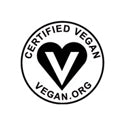
-
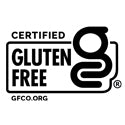
-
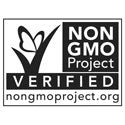
-
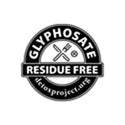
-

- Vegan, Gluten Free, Non-GMO, Glyphosate-Free, Kosher-UDE
Some people just prefer less fat, no matter how good the fat in question happens to be. And if you’re one of those nice ...
Other stuff
Be the first to know!
Get the latest on products, drops and other oat-positive news, just by signing up for our email list. How convenient.
What's Amazing
What might be less amazing
Oatly products have unsaturated fat which is in oats naturally, and also in rapeseed oil which we add to some of our products for amazing texture and performance. But this product’s one gram of fat per serving comes only from oats, which is really great in our humble opinion, but you may notice the difference in texture as compared to Oatmilk Chilled.
*Soluble fiber from foods such as oats, as part of a diet low in saturated fat and cholesterol, may reduce the risk of heart disease. A serving of Oatly Low Fat Oatmilk supplies 1 gram of the 3 grams of beta-glucan soluble fiber necessary per day to have this effect.
Other
Ingredients
Nutritional value
| Nutrition | Value |
|---|---|
| Calories | 90 |
| Fat | 1 g (2%*) |
| Saturated | 0 g (0%*) |
| Trans Fat | 0 g |
| Cholesterol | 0 mg (0%*) |
| Sodium | 100 mg (4%*) |
| Total Carbohydrate | 16 g (6%*) |
| Dietary Fiber | 2 g (7%*) |
| Soluble Fiber | 1 g |
| Total Sugars | 7 g |
| Includes 7 g added sugars** (14%*) | |
| Protein | 3 g |
| Vitamin D | 3.6 mcg (20%*) |
| Calcium | 350 mg (25%*) |
| Iron | 0.3 mg (2%*) |
| Potassium | 390 mg (8%*) |
| Vitamin A | 160 mcg (20%*) |
| Riboflavin | 0.6 mg (45%*) |
| Vitamin B12 | 1.2 mcg (50%*) |
| Phosphorus | 270 mg (20%*) |
* % Daily Value.
** To find out why it says added sugars up there when we don't add sweeteners, click here.

-
Where does the sugar come from?
Our oatmilks (aside from the Chocolate) don’t contain any added sweeteners like cane sugar, which is why they’re not listed as an ingredient. The sugar in our oatmilk is produced during our enzymatic production process. Basically, we use natural enzymes to liquefy our oats, which enables us to create a really creamy product that retains a lot of the nutrition from the original oat (like protein, unsaturated fats, fibers, and carbs). As part of this process, the enzymes break the starches in our oats down into smaller components, including simple sugar like maltose. It’s comparable to how the human body uses enzymes to break starches down into sugars during digestion. You can read more about this process here.
FDA guidance on sugar labeling now provides that any sugar created during a product’s production process should be categorized as 'added', which is why these sugars are listed as 'added sugar' on our nutrition labels. -
What’s the difference between the types of oatmilk?
We offer a variety of oatmilks which differ in flavor and fat content based on the product. Our oatmilks all start with the same oat base, to which we add varying levels of oil (like how cream gets added back into cow's milk). Our Full Fat Oatmilk has a 3.7% fat content while Original has a 2% fat content, which makes the Full Fat extra creamy. The Full Fat also contains 35mg/serving of DHA. Our Barista Edition has a 3% fat content and is formulated to work particularly well in hot beverages, like coffee. Lastly, we have a Low Fat oatmilk which is free of added oils. -
Where can I find grocery stores near me that carry Oatly?
The 32 oz cartons sold on our site are shelf-stable and will stay fresh until the best by date, so they are pretty great for storing in your pantry, on a countertop or pretty much anywhere else you can fit a carton of oatmilk. Once you open a carton, please refrigerate it and drink it within a week as noted on the carton.
The 64 oz and 32 oz chilled cartons sold in grocery stores should always be refrigerated and consumed by the best by date. Once you open a carton, please refrigerate it and drink it within a week as noted on the carton. -
Why did you use rapeseed oil?
We’re always trying to find a balance between sustainability, taste and nutritional health. Oatly has used canola oil (also called rapeseed oil in Scandinavia) in our products for many years, because we believe it is the plant-based oil that best enables us to deliver on those values. In our US operations, we use only non-GMO canola oil that is expeller-pressed with zero hexane involved in the process. In comparison to other plant-based oils, non-GMO canola/rapeseed oil also contains relatively less saturated fat and has a neutral taste profile that lets the flavor of our oats shine.
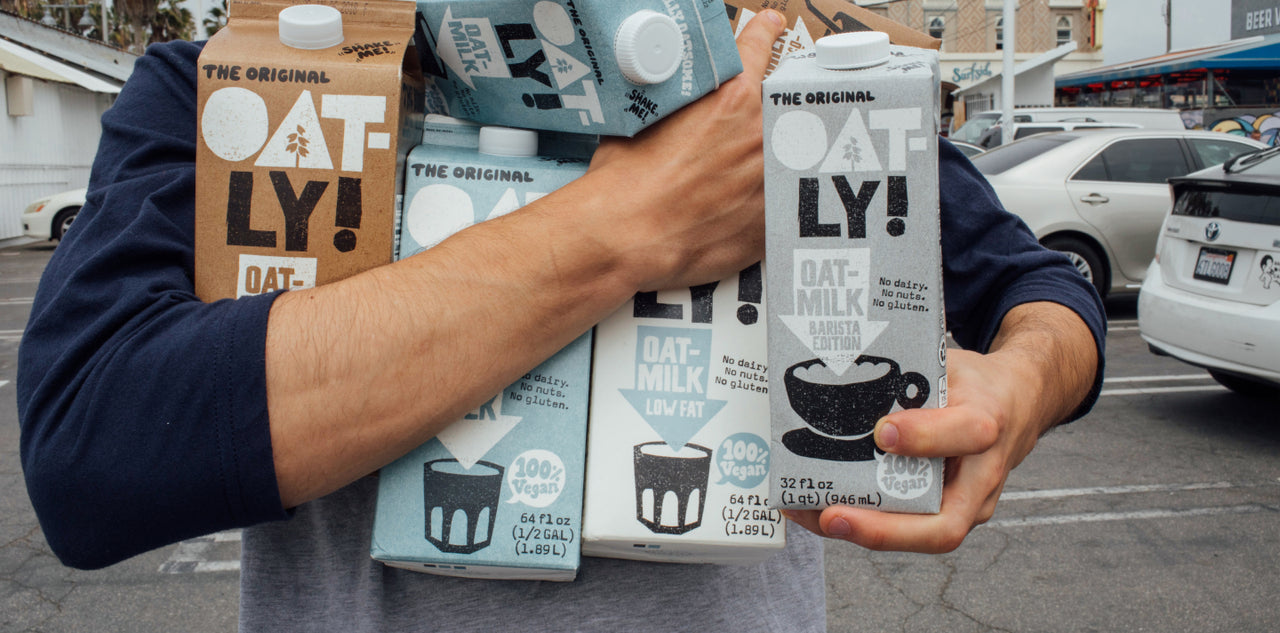
What our customers
have to say
what our customers have to say
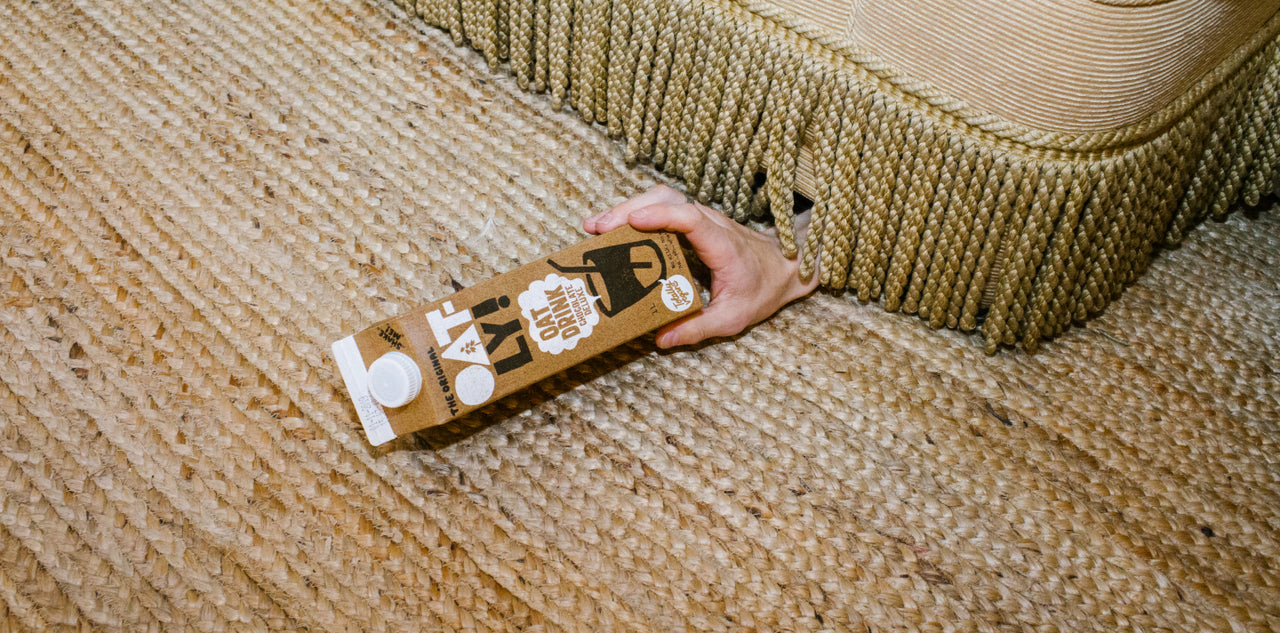
Other stuff you might like in no particular order
Where do the ingredients come from?
- Oats
- Origin: Grown in the US & Canada
- Supplier: Grain Millers
- Oat Base
- Made by Oatly in Millville, NJ
- Dipotassium Phosphate
- Origin: France
- Supplier: Brenntag
- Calcium Carbonate
- Origin: Canada
- Supplier: Caldic
- Derived from limestone.
- Tricalcium Phosphate
- Origin: USA
- Supplier: Brenntag
- Sea Salt
- Origin: USA
- Supplier: Cargill
- Dicalcium Phosphate
- Origin: USA
- Supplier: Brenntag
- Riboflavin (Vitamin B2)
- Origin: Canada
- Supplier: Caldic
- Derived from corn.
- Vitamin A
- Origin: Canada
- Supplier: Caldic
- Derived from Vitamin A Acetate.
- Vitamin D2
- Origin: Canada
- Supplier: Caldic
- Derived from sugarcane.
- Vitamin B12
- Origin: Canada
- Supplier: Caldic
- Derived from Cyanocobalamin; derived from corn.
Receive an email when Low-Fat Oatmilk Chilled comes back!
HOW DO WE MAKE OUR OATMILKS?
Our oat base is just oats and water. But it’s what we do with those oats and that water that makes Oatly so special.





